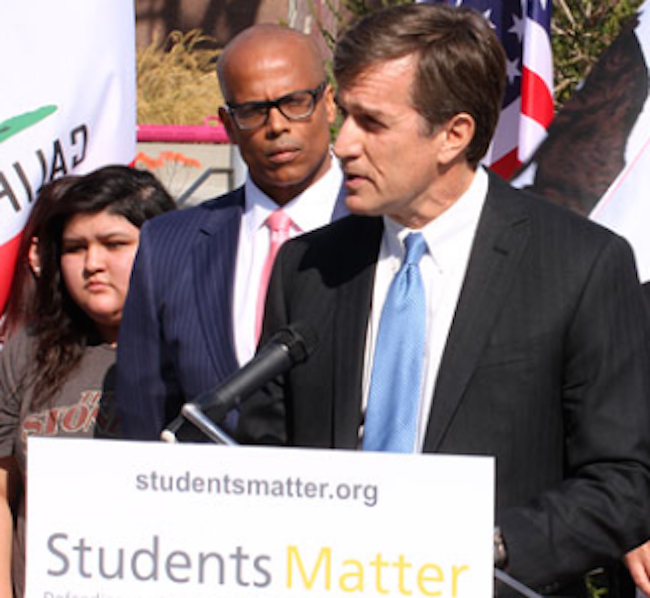
Black teachers: How to recruit them and make them stay

Lessons in higher education: What California can learn

Keeping California public university options open

Superintendents: Well-paid and walking away

The debt to degree connection

College in prison: How earning a degree can lead to a new life

The organization that filed a lawsuit challenging California’s tenure and other teacher protection laws on Tuesday asked the California Supreme Court to hear an appeal of the case. The organization, Students Matter, also endorsed legislation that would accomplish much of what it’s asking the courts to do in Vergara v. the State of California.
The last Vergara-related reform bill still standing this year, Assembly Bill 934, by Assemblywoman Susan Bonilla, D-Concord, would extend by at least a year the amount of time required for a new teacher to obtain legal rights known as tenure. It would also require that teachers’ performance evaluations be a factor, along with seniority, in deciding the order of teacher layoffs, and it would make it easier to fire poor-performing teachers who haven’t improved after year-long coaching.
In their lawsuit, Beatriz Vergara, now 17, and eight other student plaintiffs are asking the court to overturn five state statutes. Students Matter, a nonprofit funded by Silicon Valley entrepreneur David Welch, brought the case against the state and the California Teachers Association on the students’ behalf.
Attorneys for Students Matter had a historic first-round round win two years ago when Los Angeles County Superior Court Judge Rolf Treu ruled that the workplace laws impeded students’ right to an equal opportunity for an education. In his 16-page decision, Treu wrote that evidence from a two-month trial “shocked the conscience” and convinced him that a short probationary period, cumbersome and expensive dismissal statutes and last-in, first-out dismissal procedures particularly disadvantaged low-income, minority students. They ended up getting saddled with disproportionate numbers of the worst-performing teachers, he wrote.
But in a unanimous decision in April, a three-judge panel of the Second District Court of Appeal in Los Angeles rejected Treu’s ruling. The appellate court disagreed that there were grounds under the state constitution to claim that the statutes were the reason some students received an unequal education. They could have sued alleging that administrators in affected districts inequitably enforced the laws, but they didn’t go that route, the judges said.
“With no proper showing of a constitutional violation, the court is without power to strike down the challenged statutes. The court’s job is merely to determine whether the statutes are constitutional, not if they are ‘a good idea,’” the decision stated.
The California Supreme Court could choose not to take the appeal and let the appeals court decision stand on its own. But in its petition to the court, filed on Tuesday, Students Matter asked the state Supreme Court to overturn the appeals court’s flawed analysis.
“The California Supreme Court has a proud history of protecting the educational opportunities of California schoolchildren,” Theodore Boutrous, lead counsel for the plaintiffs, said in a statement. “The laws at issue in Vergara harm thousands of California students every year and are disastrous for low-income and minority communities. We are confident the Supreme Court will act to safeguard the children of this great State by granting review.”
Among the claims in the petition for Supreme Court review, plaintiffs’ attorneys argued that the court of appeal should have shown “deference” to Treu’s conclusion, as trial judge, that the state’s statutes caused disproportionate harm to low-income and minority children.
In a statement Tuesday, California Federation of Teachers President Joshua Pechthalt slammed the decision to appeal, saying, “We are disappointed but not surprised that they are continuing to spend large sums of money on the suit and the PR campaign attached to it smearing teachers and public education.”
The Supreme Court has up to 90 days to decide whether to hear the case.
Bonilla, a former high school English teacher, called her bill a reasonable “middle way through the rhetoric” surrounding the Vergara lawsuit. She said by requiring substantial coaching to beginning and struggling teachers while cutting the cost and time of firing the small percentage of worst-performing teachers, her bill would benefit students and teachers.
Teach Plus, a nonprofit teachers organization backed by foundations, endorsed the bill this week. Bonilla said she is consulting with the California School Boards Association and the Association of California School Administrators for possible changes.
Next month, AB 934, originally a technology bill that Bonilla has rewritten, will get its first hearing – and perhaps its last, given the Legislature’s reluctance so far to deal with Vergara-related reforms and opposition to her bill by the California Teachers Association and the California Federation of Teachers.
In December, the Democratic majority on the Assembly Education Committee declined to act on Republican-sponsored bills on teacher evaluation, tenure and layoffs. Democratic leaders have not moved ahead with two bills that would have revised how teachers are evaluated, a key element to reforming the laws.

Panelists discussed dual admission as a solution for easing the longstanding challenges in California’s transfer system.

A grassroots campaign recalled two members of the Orange Unified School District in an election that cost more than half a million dollars.

Legislation that would remove one of the last tests teachers are required to take to earn a credential in California passed the Senate Education Committee.

Part-time instructors, many who work for decades off the tenure track and at a lower pay rate, have been called “apprentices to nowhere.”
Comments
Comments Policy
We welcome your comments. All comments are moderated for civility, relevance and other considerations. Click here for EdSource's Comments Policy.